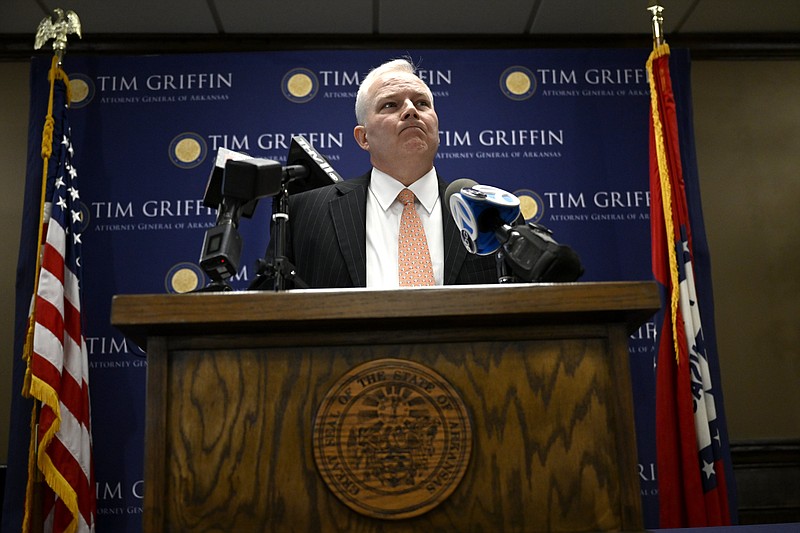Arkansas Attorney General Tim Griffin rejected on Monday a proposed referendum to repeal the LEARNS Act, calling the question's language misleading.
The effort to repeal Gov. Sarah Huckabee Sanders' signature education overhaul began on April 10 after public school advocates formed Citizens for Arkansas Public Education and Students, also known as CAPES.
Under state law, the attorney general has 10 business days to review a proposed referendum's ballot title and popular name before volunteers can begin gathering signatures to get the question on the ballot. In a letter to Steve Grappe, executive director of CAPES, the group behind the repeal effort, Griffin rejected the proposed referendum's wording for being misleading.
Griffin said the proposed ballot title and popular name for the referendum could mislead voters because it is "worded in a way that a vote for or against the issue would actually be a vote for the outcome opposite of what the voter intends."
"Because nothing in your popular name or ballot title indicates the impact of a vote for or against the measure, I must reject your draft and instruct you to redesign it," Griffin said in the letter.
Grappe said he formed the ballot question committee to repeal the LEARNS Act because of concerns about the law's voucher program and what critics perceive as a lack of state funding for teacher raises.
"We believe that this is politically motivated," Grappe said in an interview. "We have met disorganization and resistance from the [attorney general's] office from the beginning of this process."
Grappe said the proposed ballot title and popular name for the referendum copied language from the LEARNS Act itself to give voters a final chance to vote for or against the law.
A vote in favor of the referendum would show approval for the LEARNS Act, while a vote against would favor its repeal.
"The title of the [referendum] is the title of the LEARNS Act because what we are doing is putting the LEARNS Act on the ballot," he said.
CAPES will amend its proposal and submit it again for another review, Grappe said, adding that the group won't be discouraged from getting the question on the ballot for the 2024 election.
A referendum's ballot title is meant to describe the law voters are to consider. Griffin, a Republican, said he also rejected the proposed referendum for failing to properly describe the LEARNS Act. Grappe responded that it is difficult to summarize a 145-page law that covers a wide range of education policies.
Citizens have 90 days after the legislative session ends May 1 to get a referendum's application approved and collect the necessary signatures, meaning the group behind the push for a LEARNS Act repeal will still have opportunities to amend and resubmit its proposed ballot title and popular name. Citizens can propose a referendum only on laws passed in the most recent legislative session.
The state's constitution allows citizens the ability to repeal laws passed by the state Legislature through a referendum. To get the referendum on the ballot, Grappe's group would need at least 54,522 signatures from registered voters, which is 6% of the votes cast in the last gubernatorial election.
Before volunteers can start gathering signatures, the Arkansas attorney general's office would need to sign off on the referendum's ballot title and popular name.
Under a newly passed state law, the signatures would have to come from voters in at least 50 different counties.
Responsibility for validating the signatures would fall to the Arkansas secretary of state.
The LEARNS Act was the centerpiece of Sanders' legislative agenda during the session, with the Republican governor calling it "the largest overhaul of the state's education system in Arkansas history." The law will allow students to use state funding for education to cover the costs of attending a private or home school.
Under a phased-in voucher program, students will receive 90% of the per-pupil funding schools get each year from the state. The law also calls for increasing the starting salaries for teachers from $36,000 to $50,000 and $2,000 raises for those already paid above the new minimum.
Grappe said he formed his ballot question committee after the pushback the law received during a series of town halls that he hosted as chair of the Arkansas Rural Caucus. Grappe said the bill's voucher program will hurt rural schools and he is worried school districts won't be able to afford the higher salaries for teachers.
Grappe also said some are concerned about the law's requirement that students complete 75 hours of community service by the time they graduate, which could be burdensome for those living in farming communities.
"The LEARNS Act, which was passed during the 2023 legislative session with very restricted input from citizens, will detrimentally impact public education in Arkansas," Grappe said in a statement. "The law will also have a negative impact on the communities surrounding the public schools."
